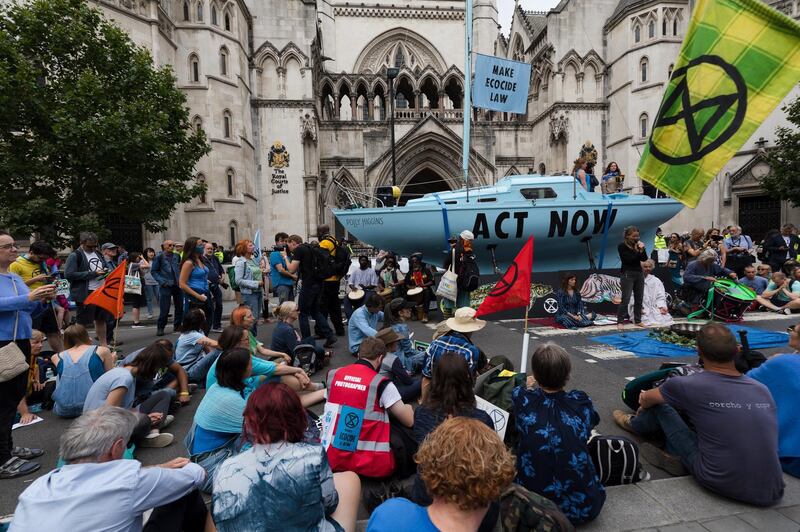Climate change activists from Extinction Rebellion have staged demonstrations across Britain, disrupting traffic as they call for a radical reduction in greenhouse gas emissions in five cities.
The so-called “summer uprising,” beginning on Monday and due to continue into the coming week, has hit the UK capital of London as well as Glasgow, Cardiff, Bristol and Leeds. The group of activists, many of them still in school, is using the separate demonstrations to call for a net zero reduction in greenhouse gas emissions by 2025.
In London, where the largest demonstration has taken place, hundreds of protesters have blocked the Strand, one of the city's major thoroughfares. A spokesman for Extinction Rebellion told The National that roughly 1,600 protesters had agreed to take part in the London demonstrations with as many as 4,000 individuals involved across the UK throughout the week.
While the nationwide protests are calling for government action on climate change each city is focusing on a different pressing threat to the environment – climate migrants, drought, rising sea levels, extreme weather conditions and wildfires.
In London, where a bright-blue boat appeared at the sit-in outside the Royal Courts of Justice, Jo Rogers, 43, an Extinction Rebellion activist, told The National there was a peaceful atmosphere among the several hundred people at the sit-in.
“It is very colourful with the flags of many different colours: blue, red, green, pink with the Extinction Rebellion logo, all different ages. It is very cute. There are lots of kids around – many of them have little boats themselves,” she said.
In a statement on Twitter, the London Metropolitan Police have said it is aware of the ongoing protests in London with a “a proportionate policing plan in place”.
Extinction Rebellion has grabbed media attention in part because of its co-ordinated use of civil disobedience and its activists’ willingness to be arrested.
Across 10 days in April 2019, Extinction Rebellion protests brought parts of London to a standstill as demonstrations were launched in Oxford and Piccadilly Circuses, Marble Arch and Waterloo Bridge. Through civil disobedience the activists sought particularly to block major roads and bridges, creating stages and sit-ins that disrupted traffic and caused travel chaos for commuters. More than 1,000 people were arrested during the days-long action.
Since the UK protests, the Extinction Rebellion has spread beyond London with demonstrations in solidarity being held in Berlin, Brussels, Australia and the United States. Since being founded by British academics in 2017 the environmental protest group has become one of the fastest-growing climate change movements in the world.
Ms Rogers said that in London police attended the protests but there had been no arrests and no indication that police are poised to move the demonstrators along. “The road has been cordoned off and there is no traffic going down the road here. The police are great. There is some police presence but it is very chilled,” she said.
Rose Fredrick, a 16-year-old schoolgirl from Lewes in the south of England, had come to the demonstration with her mother. She explained young people had rallied against climate change, following the example of Greta Thunberg the 16-year-old Swedish activist who has become the face of the international environmental movement, because of the failure of older generations to grapple with the problem.
“It is really because we don’t have long. We have got 12 years until it is irreversible damage and the world is already seeing effects,” she said. “It will be England and America. It is prominent and our countries and our families are going to suffer,” Ms Fredrick added.







